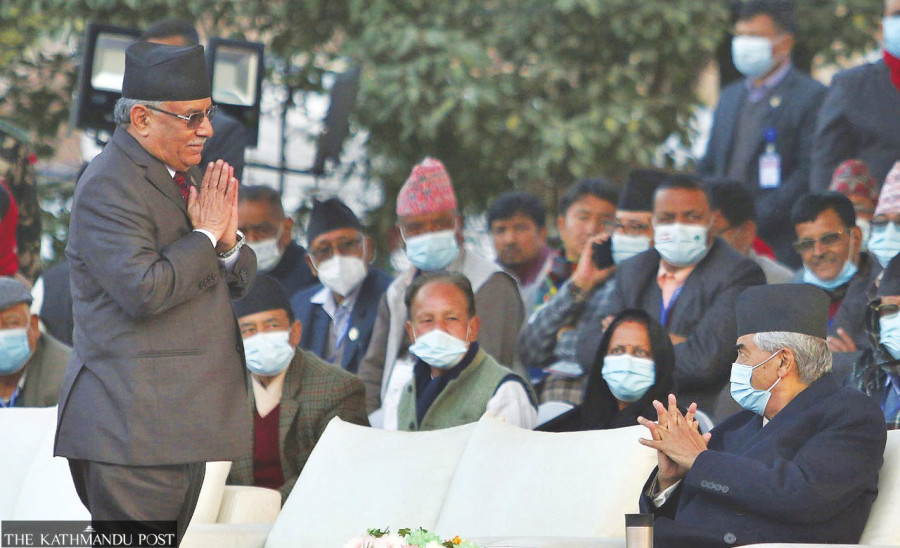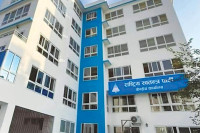Politics
As Congress debates rationale behind alliance politics, left parties discuss a communist front, if not unity
A section in the Congress party questions Deuba if coalition partners must fight the upcoming polls together.
Anil Giri
At a time when some communist party leaders are batting for a left alliance in the upcoming federal and provincial elections, the Nepali Congress has started discussing how sharing of seats is possible among the current coalition partners.
During a function on Saturday, senior CPN (Maoist Centre) leader Narayan Kaji Shrestha proposed an electoral alliance between the Maoists, CPN-UML and other left-leaning parties. UML chair KP Sharma Oli was also present at the programme.
“If unity among the communist parties is not possible, let’s make initiatives for a joint front for the upcoming polls,” said Shrestha.
Oli was quick to reject the proposal.
He responded to Shrestha, saying the Maoist Centre should rather walk out of the coalition and sever its association with the Congress.
“If anyone considers they are communists, I request them not to follow the Congress, leave the alliance, not to join the SPP [the US’s State Partnership Program]… then let’s join hands,” Oli said. “Didn't communist leaders go to court to bring down the communist government and form this government led by the Nepali Congress? Didn't the communist parties go to Parliament to overthrow the communist government and form a coalition government under the leadership of Deuba?”
But a senior UML leader who is also an office bearer of the party said that as of now there is no talk about joining hands with the Maoist Centre.
“We heard that during the visit of the Chinese delegation, there was a push for unity between the UML and the Maoist party. It is both technically difficult and politically a complex process,” the leader told the Post. “The first and foremost condition, as Oli said today, is the Maoists should sever ties with the Congress and they should also answer some crucial questions that had arisen when we were in the Nepal Communist Party (NCP).”
The UML and the Maoist Centre had fought the election together in 2017 and later merged in 2018 to form the Nepal Communist Party. But in May 2021, the party was invalidated by the Supreme Court following months-long infighting in the NCP.
A section of the Congress that was against fighting local elections in May under an alliance is still questioning if the party should continue the alliance in the polls scheduled for later this year.
Seat-sharing is set to be a complicated issue among the four of the five coalition partners—Congress, Maoist Centre, Unified Socialist and Janata Samajbadi Party. The fifth coalition partner is Rastriya Janamorcha.
Janata Samajbadi is currently on the verge of a split.
“The Maoists will not contest the elections alone,” said Home Minister Bal Krishna Khand at the party’s Central Working Committee meeting on Saturday. “They [Maoists] will definitely seek a partner while contesting the elections. While forging the alliance with the Maoists in the elections, we have to adjust some seats or lose some seats. So we have to be ready for this.”
There was a division in the Nepali Congress over seat-sharing arrangements ahead of local polls.
The rival camp, led by Shekhar Koirala and General Secretary Gagan Thapa, is of the view that the party should be careful if it is going to fight the upcoming elections under an alliance.
But Deuba, who enjoys a majority in the Central Working Committee, is in favour of continuing the alliance with the Maoist Centre and the three other partners. But they have yet to discuss seat-sharing.
Deuba said at the meeting that he cannot deceive Pushpa Kamal Dahal and Madhav Nepal and the alliance with them will continue in the upcoming elections.
“We have to go together. And our only objective is making the Nepali Congress the largest party,” Ramhari Khatiwada, a central member, told the Post, quoting Deuba.
In the meeting, General Secretary Thapa asked Deuba about the stability of the government to be formed after the elections.
Thapa, who represents the rival faction, has been speaking against Deuba’s one-sided working style and questioning the performance of the government.
“We may want to go to the elections under the alliance and that may ensure the victory of the ruling alliance. But will that alliance continue for the next five years? Will it ensure political stability in the country?” Thapa said. “Before making a decision on the alliance, we have to convince the people and voters about the objectives of the alliance and political stability in the country. Otherwise, we will plunge into a vicious cycle of political instability.”
The ongoing meeting of the Central Working Committee will find some ways of seat-sharing, according to Congress leaders.
Meanwhile, speaking with reporters in Nawalparasi, Koirala said on Saturday that the Congress should fight the elections under the alliance but only by ensuring minimal damage to the party.
“We are seriously discussing how to forge an alliance in the elections but such an alliance must not cause much damage to the party,” said Koirala. “We did not know the exact number of our voters who had to vote for other parties in the local elections.”
Koirala, who leads the rival faction in the Congress, said the party should not repeat the mistakes that happened in the local elections.
Some observers and experts say there are some internal as well as external dimensions that could impact the current coalition.
“The visit of Maoist chair Pushpa Kamal Dahal to India is aimed at strengthening the ruling coalition,” said Shikrishna Anniruddha Gautam, a political analyst. “I think for larger communist unity, Oli is the main obstacle.”
According to Gautam, China no doubt is backing unity among the communist forces.
“India, as well as the United States, is trying to prevent such a unity among the communists,” Gautam told the Post. “Delhi’s sudden interest in internal politics of Nepal after maintaining silence for some time is apparent from the invitation to Dahal.”
Dahal on Friday left for the Indian capital, days after a Chinese delegation concluded its four-day visit to Kathmandu. The Maoist chair’s visit has been viewed as political by experts and observers given the way his meetings have been planned in Delhi. On Saturday, he met with Indian External Affairs Minister S Jaishankar and National Security Advisor Ajit Doval. Dahal is scheduled to call on Indian Prime Minister Narendra Modi on Sunday.
As far as the internal factors are concerned, one is Madhav Kumar Nepal who split from the UML in August last year to form the CPN (Unified Socialist).
After its performance in local elections, the party is not happy with the current coalition. It, however, has few options left. It cannot walk out of the coalition unless it gets assurances from the UML of a partnership during the two crucial elections.
Gautam, the analyst, said if the interests of Oli and Nepal converge, unity among current and former UML members is possible.
“It can happen in a jiffy,” he said. “In that case, any effort for a larger left alliance can gain momentum, with internal and external elements at play.”




 8.26°C Kathmandu
8.26°C Kathmandu















